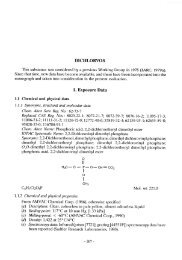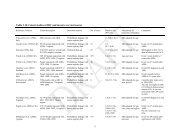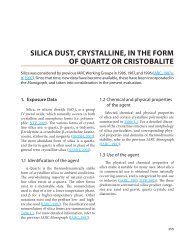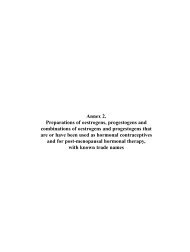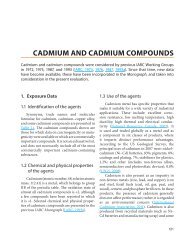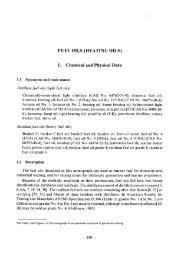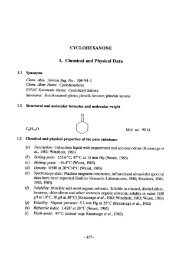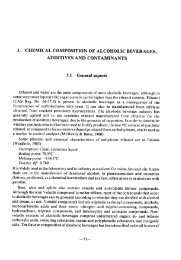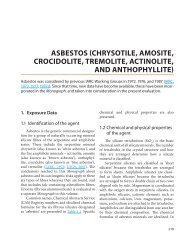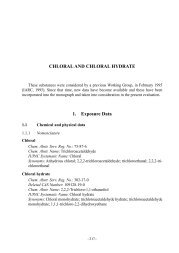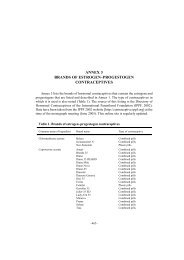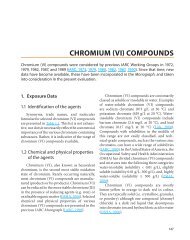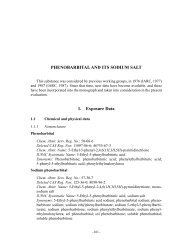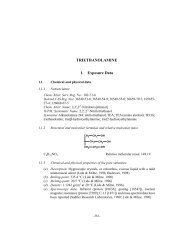BETEL-QUID AND ARECA-NUT CHEWING - IARC Monographs
BETEL-QUID AND ARECA-NUT CHEWING - IARC Monographs
BETEL-QUID AND ARECA-NUT CHEWING - IARC Monographs
Create successful ePaper yourself
Turn your PDF publications into a flip-book with our unique Google optimized e-Paper software.
Regulation of import and sale of areca-containing products<br />
(a) India<br />
On 1 August 2002, the Commissioner for Food and Drug Administration and Food<br />
(Health) Authority, Maharashtra State (Sharma, 2002), issued a gazette notification<br />
banning the manufacture, sale and storage of gutka and pan masala or any similar product<br />
containing or not containing tobacco. The law was enforced based on the powers conferred<br />
by Clause iv of Section 7 of the prevention of Food Adulteration Act of 1954 in the<br />
interest of public health, and the prohibition of these food articles will remain in force for<br />
a period of 5 years.<br />
In India, a warning label is required on commercial areca-nut and tobacco products,<br />
but there are no regulations about the size of the letters. Gutka has been banned by several<br />
state governments: Tamil Nadu, Adhra Pradesh and Goa. Several other states are at<br />
various stages of passing laws to ban gutka or are in court after being challenged by the<br />
industry. A recommendation that gutka should be banned nationwide has been made to the<br />
central government by the Central Committee on Food Safety.<br />
(b) North America<br />
Areca nut figures on the list of herbs that are unacceptable as a non-medicinal<br />
ingredient in oral use products (Health Canada, 1995). The sale of areca products has been<br />
banned in Canada as a result of the link between arecoline and mutagenic effects (see<br />
Section 4.4.2(a)(iv)). The US Food and Drug Administration maintains an import alert<br />
within the USA, the main concerns being adulteration and addition of unsafe food additives<br />
(Croucher & Islam, 2002). In 1976, the US Government announced a ban on interstate<br />
traffic of areca nut (Burton-Bradley, 1978).<br />
(c) European Union<br />
<strong>BETEL</strong>-<strong>QUID</strong> <strong>AND</strong> <strong>ARECA</strong>-<strong>NUT</strong> <strong>CHEWING</strong> 79<br />
Within the European Union (excluding Sweden), there is legislation banning the sale<br />
of tobacco products for oral use, particularly those presented in sachet portions or porous<br />
sachets, with the exception of those intended to be smoked or chewed. However, there are<br />
no specific laws regulating or banning the sale of areca products, even when mixed with<br />
smokeless tobacco, as chewing tobacco is excluded from the directive (Council of the<br />
European Communities, 2001).<br />
United Kingdom<br />
In the United Kingdom, there is no law to regulate the import or sale of products containing<br />
areca nut and at present numerous areca preparations, with or without tobacco, are<br />
commercially available (Bedi, 1996; Vora et al., 2000). The Department of Trade and<br />
Industry classifies these products as sweets (Hogan, 2000). Labelling and a list of ingredients<br />
on the packaging are sometimes non-existent. Several studies have shown that, in<br />
most outlets, sales are unrestricted to minors (Shetty & Johnson, 1999; Warnakulasuriya<br />
et al., 2002). A study by Trading Standards Officers in Birmingham revealed that children



